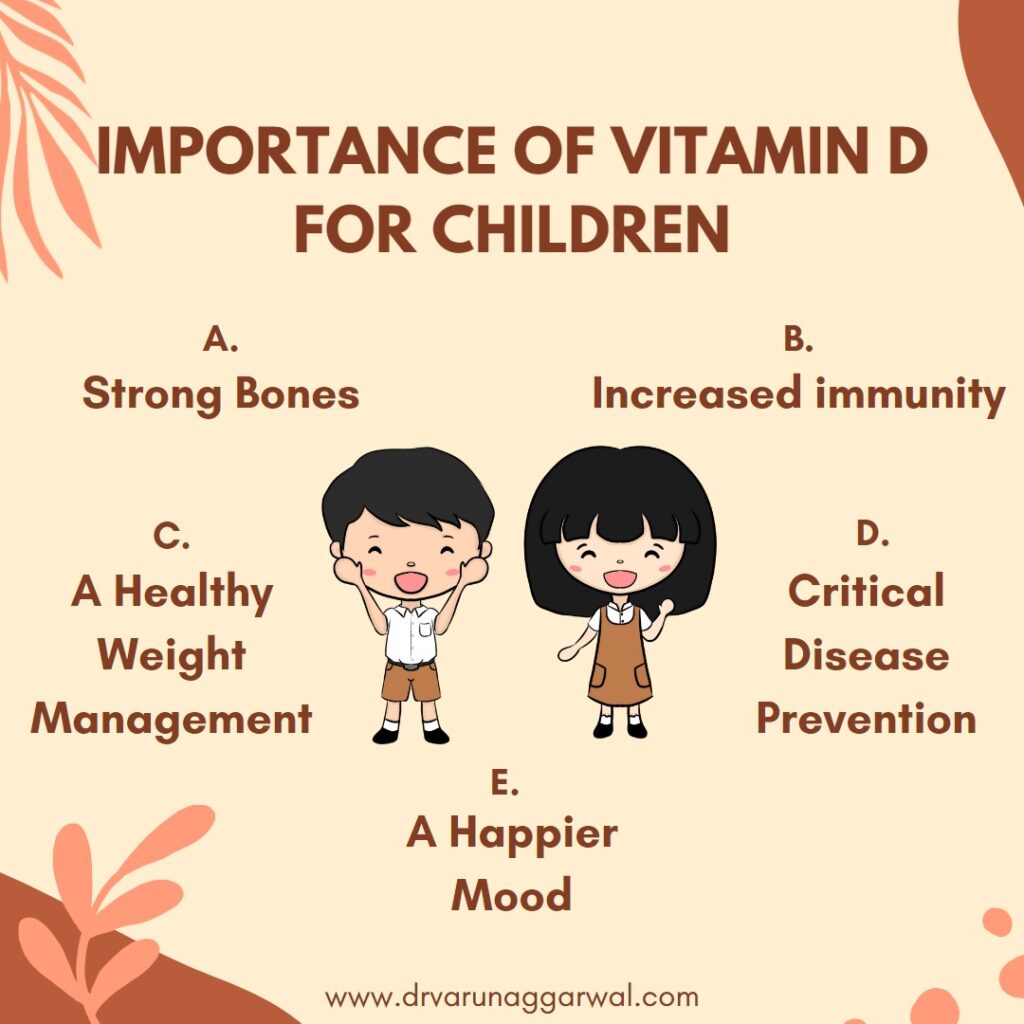Vitamin D is one of the key nutrients that contributes to normal skeletal development during the early stages of life. Therefore the importance of vitamin D for the development of children cannot be underestimated.
People often believe that children get enough vitamin D from milk and playing outside. Unfortunately, this is not the case. According to some studies, many children are not getting enough vitamin D, which affects their overall growth and health.
A study estimated that the majority of deficiency is 62–95% in newborn(0–6 months), 46–80% in 6–60 months of age, and 37–97% in 5–20 years old.
Generally people are now aware of the importance of Vitamin D for children, that’s why they ignore the Vitamin D intake. So, in this blog, I will tell you how important is Vitamin D for the overall growth of your children.

Let’s See The Importance Of Vitamin D For Children
Strong Bones
A balanced diet rich in calcium and phosphorus is essential for good bone density, strong teeth, and a healthy skeletal system. However, the body cannot absorb calcium and phosphorus without vitamin D3. Lack of calcium and phosphorus in children can cause rickets, a dangerous condition in which the bones grow brittle and the legs seem bent. Therefore a sufficient Vitamin D intake is necessary for stronger bones.
You can contact Dr Varun Aggarwal(ortho doctor in Chandigarh) for any query regarding the bones.
Increased immunity
Vitamin D regulates cellular function, stimulates immunity, and builds disease resistance in the body. A study published in 2006 found that vitamin D also protects against influenza and respiratory viruses. It makes vitamin D even more crucial in these Coronavirus days.
A Healthy Weight Management
Children who are vitamin D deficient may gain weight unhealthily. Obesity is widespread in India and vitamin D deficiency is a major factor in obesity among children. Vitamin D dangers associated with acute deficiency include metabolic illness.
Critical Disease Prevention
According to some studies, vitamin D helps prevent prostate tumours, cancer, and heart disease. Still, there isn’t enough evidence to back up the claim. However, research indicates that children with serious illnesses have low levels of vitamin D in their bodies.
A Happier Mood
The mood is greatly influenced by vitamin D. Children who spend enough time outside are happier and less irritable than children who do not spend much time outside. Vitamin D also plays an important role in helping children overcome depression, along with clinical treatment.
Vitamin D Requirement In Children
The Vitamin D is measured both in international units and micrograms, different figures can be found. Taking international units into account, 400 international units are recommended for a normal born baby. However, if the baby is born before the scheduled time, a higher dose is suggested. In the first two years, a regular baby needs 400 units, and later that, 600 units.
How Can Optimal Vitamin D Levels Be Achieved?
Breast milk alone is not an excellent source of vitamin D, so while the baby is on breast milk, vitamin D should be supplemented either through drops or fortified foods. If the infant drinks only cow milk, adding vitamin D supplements to the intake is a must. As an alternative to drops, foods like oil, butter and orange juice may help in attaining adequate levels. As the child grows, give him more dairy products and fortified foods. An egg is a good source, especially the yolk. Fish is another excellent source, but not for vegetarians and infants. If you are a vegetarian, you can add mushrooms, soya and beans to the diet.
Sunlight is also a great and natural way of getting vitamin D. The body produces vitamin D when exposed to sunlight. Vitamin D levels in kids may be increased by a little exposure to sunlight early in the morning. However, excessive exposure to sunlight may negatively affect the skin of your child.
Hopefully, after reading this blog, you have now understood how important Vitamin D is for the overall development and health of children.
Click here to contact for more information


